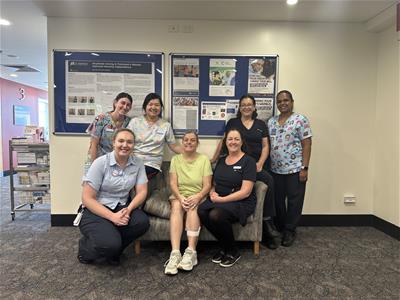.jpg?sfvrsn=9131bb65_1) When Courtney woke up feeling unsteady one Sunday morning in October 2024, she had no idea she was about to spend the next four months in hospital.
When Courtney woke up feeling unsteady one Sunday morning in October 2024, she had no idea she was about to spend the next four months in hospital.
In her 40s and living an active, social life, Courtney was thriving in her career in human resources.
There’d been the occasional migraine over the preceding months, but she had explained those symptoms away, and put the headaches down to stress.
That Sunday morning, however, felt different.
“I was feeling wobbly and needed to hold onto the furniture just to walk around the house,” Courtney said. “I knew something wasn’t right.”
Courtney’s brother drove her to the Emergency Centre at St Andrew’s War Memorial Hospital, where initial tests revealed extremely high blood pressure.
She was admitted to the neurology ward for further monitoring and doctors confirmed she had experienced multiple strokes.
“It was a shock. I’m not overweight, I’m fit, social, and working full-time. There were no clear warning signs,” Courtney said.
The strokes were diagnosed as Transient Ischemic Attacks (TIAs), often described as ‘mini-strokes’. One, she remembers vividly.

“I lost feeling in my arm and I knew something was happening. My neurologist, Dr Stephen Read, asked me to repeat a sentence. I wanted to, but I just couldn’t get the words out,” she said. “That one lasted about 40 minutes.”
While her treating team searched for the cause, Courtney was transferred to The Wesley Hospital for a PET scan.
“During that scan, they discovered I had rectal cancer. It wasn’t the cause of the strokes, but it likely contributed to them,” Courtney said.
Fortuitously, the cancer had been found early, allowing for prompt surgery with colorectal surgeon, Dr Damien Peterson.
With a clearer picture, Courtney’s treatment shifted focus, but her recovery wasn’t without hurdles. Complications after surgery meant time in Intensive Care and a series of follow-up procedures.
While it can’t be confirmed without brain surgery, doctors suspect brain vasculitis was the cause of her strokes. Courtney had also experienced strokes in her eyes as a result of eye vasculitis causing ongoing low vision impairment.
Still, Courtney remained determined to rebuild her strength, and began rehabilitation under the guidance of Dr Marc Galbo and the St Andrew’s rehabilitation team.
“At first, I was using a walker, but slowly, I began to walk unaided again,” Courtney said.
“We practised simple, everyday tasks like making tea and toast. It’s about retraining the brain. The team described it as learning to drive around boulders on the road. Sometimes you have to drive around or go the other way to get to where you are going,” she said.
With time, perseverance and support from both her family and care team, Courtney was able to return home, first for a short visit and then permanently.
“Sleeping in my own bed that first night was amazing, the best sleep I’d had in months,” she said.
“To walk around the house, smell the grass of people mowing and to have a home cooked meal felt amazing.”
In late January 2025, Courtney was officially discharged from the ward. While her recovery continues as an outpatient, she remains optimistic and focused on her goals.
“The doctors and staff were incredible, especially the allied health team. They have the difficult job of getting you up and out of bed to do the things you don’t want to do,” Courtney said.
“But then you realise what your capable of and that’s an incredible moment.”
Reflecting on her time spent at St Andrew’s, Courtney said her family already held St Andrew’s War Memorial Hospital close, but the connection is even stronger now.
“My mother trained here as a theatre nurse and she met my dad in the local area. It’s our family hospital and we will always hold St Andrew’s dear to us,” she said.
With Courtney’s strength and determination, achieving her next goal is only a matter of time.
“I want to walk on the sand and swim in the ocean at Mooloolaba Beach. It’s my favourite place in the world, and the team is helping me get there.”
Courtney also aims to become a St Andrew’s volunteer in the future, following additional surgeries planned for 2025.